Mahsa Amini Honoured With Europe’s 2023 Sakharov Prize

Mahsa Amini was given the 2023 Sakharov Prize for Freedom of Thought posthumously at a ceremony in Strasbourg on Tuesday.

Mahsa Amini was given the 2023 Sakharov Prize for Freedom of Thought posthumously at a ceremony in Strasbourg on Tuesday.
The European Parliament awarded the prestigious prize to both the student who was killed by Iranian police, and the Woman Life, Freedom protest movement.
Saleh Nikbakht, an academic and lawyer representing Mahsa Amini's family, along with Afsoon Najafi, and Mersedeh Shahinkar, Iranian women's rights defenders who left Iran in 2023, stood as representatives for the laureates.
Opening the award ceremony, European Parliament President Roberta Metsola announced: “This years’ Sakharov prize… serves as a tribute to all the brave and defiant women, men and young people in Iran, who despite coming under increasing pressure, are continuing the fight for their rights and push for change.ʺ
On September 13, 2022, Mahsa, a 22-year-old Iranian Kurdish woman, was apprehended by Tehran police for purportedly defying Iran's mandatory hijab. She succumbed to injuries inflicted during her time in custody, dying in the hospital three days later.
The death of Amini sparked nationwide protests predominantly led by women.
En route to France to accept the Sakharov Prize for Freedom of Thought on December 8, the parents and brother of Amini were met by a roadblock at Tehran airport where Iranian authorities halted them and confiscated their passports.
In Strasbourg, the family was represented by their attorney, Saleh Nikbakht, who relayed a message from Amini's mother, Mozhgan Eftekhari saying: “Mahsa’s grief is eternal to me, and she is undying for people all over the world. I firmly believe that her name, beside that of Joan of Arc, will remain a symbol of freedom.”
Established in 1988, the Sakharov Prize for Freedom of Thought, named in honor of Soviet physicist and political dissident Andrei Sakharov, is awarded each year by the European Parliament to honor individuals and organizations defending human rights and fundamental freedoms.
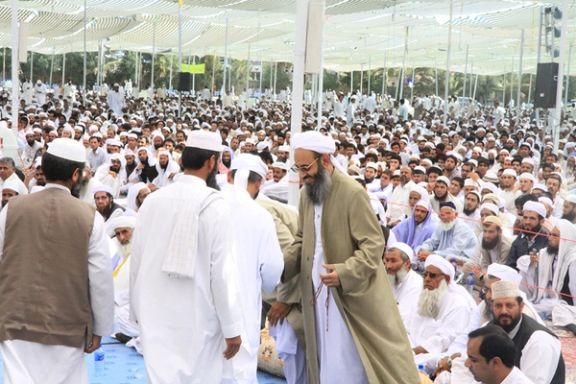
Iranian security forces have raided two Sunni schools in Zahedan and arrested tens of students from the religious minority.
Mowlavi Abdolhamid, the outspoken Friday Prayers Imam of Zahedan, denounced the attack in a tweet on Monday night, calling it a "provocative move by military and security forces" of the Islamic Republic.
He said "dozens of religious students" were arrested during the raid, which he claimed shows that provincial authorities are not genuinely concerned about the peace of the people in the province.
Halvash, a news outlet covering the province, has reported the detention of "at least 253 students."
The “pretext” for the raids was the “expulsion of foreign nations”, according to a statement from the Zahedan Seminary Teachers' Society.
The authorities of the Islamic Republic have not yet issued a response to the reports.
Over the past four decades, the Islamic Republic has imposed extensive restrictions on religious minorities in Iran, including Sunni communities.
Mowlavi Abdolhamid had previously criticized the Islamic Republic for prohibiting the establishment of Sunni mosques in major cities in Iran. He has also expressed support for the nationwide protests titled Woman, Life, Freedom over the past year, a stance that has provoked discontent from the authorities of the Islamic Republic.
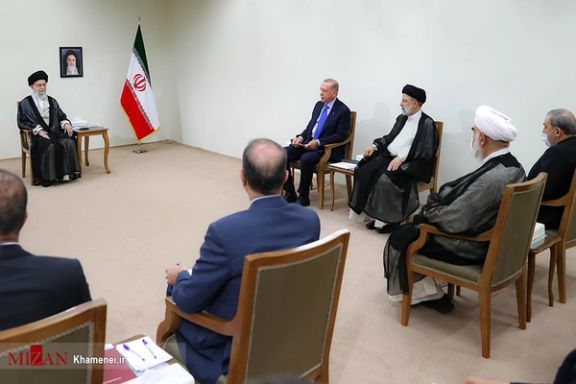
The Islamic Republic in Iran and the Erdogan regime in Turkey act with remarkable similarity in using religion to gain loyal followers in the West.
What the Shiite regime in Iran did over four decades to make religious institutions state-owned entities with success, Atatürk did in a secular regime and made all religious institutions officially state-owned by establishing the Department of Religion (1924).
The Grand Mufti of Turkey is appointed by the executive branch. Diyanet organization has more than 150 thousand employees and about two billion dollars of government budget. The imams of around 85,000 mosques in Turkey and 2,000 mosques abroad (under the supervision of this department) are recruited by this organization and the contents of their speeches are also sent weekly, which is done in Iran by the Friday Prayer Office in Tehran.
Until the 1970s, the Diyanet organization operated within Turkey, but after that, it expanded its network to countries with Turkish immigrants. Since the 1990s and with the rise of the Islamists, this organization has expanded its facilities and staff and received tremendous funding by quadrupling its budget in one decade. It has become a tool for expanding Turkey's ideological, political, and even security sphere of influence in the Balkan Peninsula, Central Asia, Western Europe, and the United States. Thus, civil and independent religion neither exists in Iran under the Islamist regime nor in Turkey under the Erdogan regime.
When the government claims to promote religion as a tool to shape social and political life, and religion is a means of gaining and maintaining power, it harms both religion and the state. It is for this reason that the behavior of the Khamenei and Erdogan regimes in using religious institutions to consolidate their power and expand their influence are very similar, while they operate in two different political systems.
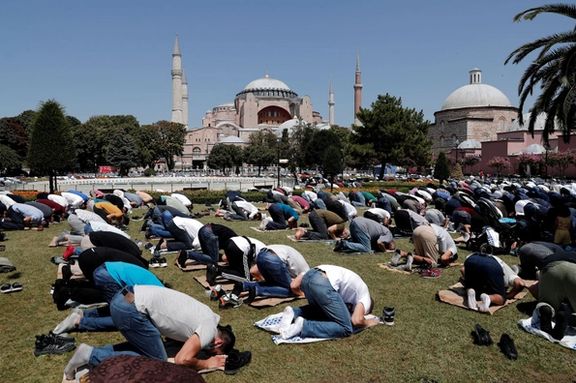
When religious institutions become state-owned, religion becomes a tool of power and it doesn't matter if you have an Islamist or a secular political system. This is why the Diyanet organization acts in the same way as the Mustafa University and the Shiite regime's Islamic Culture and Communication Organization in terms of political-religious propaganda abroad. Erdogan and Khamenei are acting in the same way in financing and expanding religious institutions worldwide. They have formed a network of mosques and religious centers that serve as venues for the gathering of religious followers who are residents of other countries. Using their religious networks these governments promote their political and ideological agendas.
It is important to pay attention to the organizational structure, funding, and programs of these centers. Turkey's state mosques are managed in the US by an organization called "Dyianet Center of America" with its headquarters in Maryland and its 29 mosques scattered all over the United States. The Dyianet Center of America website mentions these mosques under the title of its branches. As of 2018, Diyanet was operating in 36 countries with 61 branches.
All the Turks who attend the mosques linked to Diyanet Center of America did not immigrate to America from Turkey, but some of them immigrated to the United States from countries such as Georgia, Russia, Ukraine, Kazakhstan, and Azerbaijan. What brings these people together is their religious orientation and cultural background. Using the tendency of these Turkish-speaking peoples to worship and congregate, the Turkish government subjects them to political propaganda and buys their loyalty.
The budget for the construction, maintenance, and programs of thousands of mosques affiliated with the Diyanet Center of America and European countries is provided by the Turkish government; missionaries and managers of these centers are sent by the government and receive government salaries, and all programs are approved, funded, and implemented by the Turkish government. Any program that does not fit into the government’s political Islam agenda and the expansion of its influence in the world (especially in Western countries where there is freedom of religion) is not tolerated and immediately canceled in these centers and mosques.
The Diyanet- and the government which manages it- see Islam as one of the features of the identity of Turkish citizens living abroad. The macro-political strategy of Erdogan and Khamenei regimes is to rebuild Ottoman and Iranian empires with a cover of Islamism based on a mixture of religious beliefs and national-historical pride. Therefore, Diyanet is “committed to protecting the Muslims’ religious and cultural roots in the face of assimilationist policies.” Based on this statement, Turkish diaspora’s integration into host societies is something that should never happen.
Due to the author’s observations in mosques under the administration of Diyanet in the New York/New Jersey area, the authority and legitimacy of the political regime of Turkish Islamists are promoted in three ways:
1. The presence of political officials of the regime in religious ceremonies and giving prizes to children and financing religious centers and mosques with public resources;
2. Using these mosques and centers for political mobilization in favor of the government in areas such as voting for the ruling party candidates in elections; and
3. Recruiting forces for networking, gathering information from the opposition, and distributing positions, rents, and facilities available to the government.
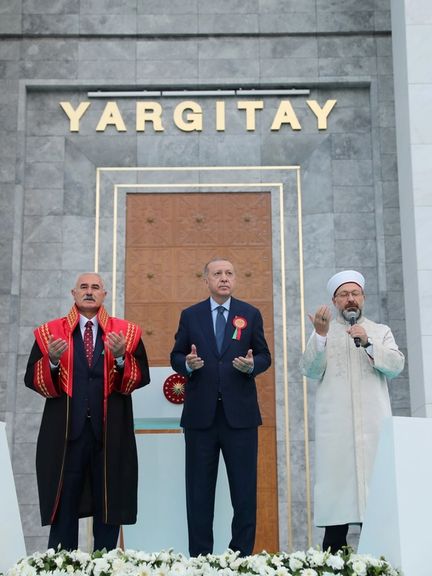
The activities of the Turkish Directorate of Religious Affairs (Diyanet Isleri Baskanligi) are based on multi-purpose missions. The main mission is to promote Sunni Islam, but without other missions, this department would not have expanded to this extent it has and would not have received huge funding.
The main content of religious centers and mosques is holding religious ceremonies (such as Friday and congregational prayers, Eid al-Adha and Fitr, and the celebration of the birth of the Prophet), delivering various religious services such as Hajj and Umrah as well as various religious educational activities for Turkish migrants, children's religious education (recitation of the Qur'an, the principles of religion) and the establishment of religious classes and schools (for the teaching of jurisprudence and theology). What is really presented in this content is a kind of political perception of Islam and injecting it into the minds of Muslim children to internalize the ideology of political Islam. It is used as a tool for Turkey’s propaganda and indoctrination. The main discourse of the content of these programs is not human rights articles based on the equality of rights of all people, including men and women, Kurds and Turks, Muslims and non-Muslims, homosexuals, and non-homosexuals.
There have been accusations of Diyanet personnel gathering intelligence and spying on behalf of the Turkish state. In January 2017, the Turkish-Islamic Union for Religious Affairs (DİTİB) admitted that some of its imams in Europe had spied for the Turkish government and supplied Ankara with intelligence on people supposedly linked to the Gülen movement, a religious group the Turkish government accuses of masterminding a coup attempt in July 2016.
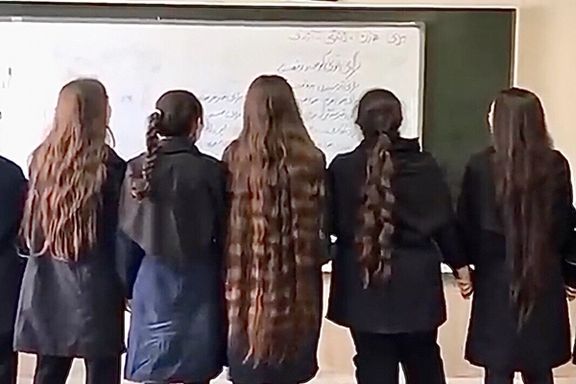
An Iranian education official has called for the enforcement of hijab among students to go far beyond school uniform rules.
Mohammad Hossein Poursani, the Director-General of Cultural and Artistic Affairs at the Ministry of Education in Iran, raised concerns over "the areas of chastity, hijab, fashion, and clothing among students".
He said: "The subject of fashion and clothing in education aims to familiarize students with Islamic-Iranian clothing, and the outcome of this effort should be that students become acquainted with and practically use Islamic-Iranian clothing.
"The Ministry of Education, considering the diversity of activities, should pay special attention to the implementation of activities and programs in the field of chastity and hijab."
In recent months, hardliners in Iran have attempted to impose strict hijab rules in public spaces, including government offices, schools, universities, and hospitals.
However, many women continue to defy the imposed hijab regulations.
Social media images depict an increasing number of women appearing in public without head coverings, despite potential consequences from hijab enforcers. Some celebrities who participated in the Woman, Life, Freedom protests, where they removed their hijabs, continue to defy re-imposing it, even at the risk of being banned from work.
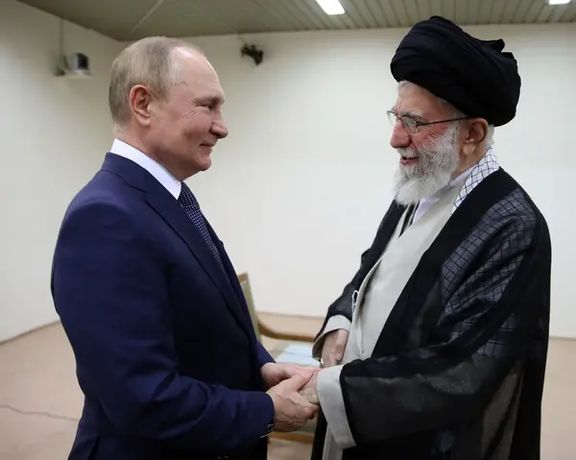
Russia and Iran will speed up work on a "major new interstate agreement", the Russian foreign ministry said on Tuesday.
It did not detail the scope of the agreement, which comes amid growing political, trade and military ties between Moscow and Tehran that the United States views with concern.
In a statement, Russia said the two countries' foreign ministers agreed in a phone call on Monday to speed up work on the agreement, which was at "a high stage of readiness".
Last week President Vladimir Putin held five hours of talks in the Kremlin with Iranian President Ebrahim Raisi.
Russia has procrastinated in renewing a two-decade-old strategic agreement with Iran, but with the war in Ukraine Moscow depends on Iranian weapons, such as kamikaze drones.
Like North Korea, whose leader Kim Jong Un met Putin in Russia's far east in September, Iran is an avowed enemy of the United States and can provide Moscow with military hardware for its war in Ukraine, where Russia has made extensive use of Iranian drones.
The Kremlin last month said Russia and Iran were developing their relations, "including in the field of military-technical cooperation” but declined to comment on a suggestion by the White House that Iran may be considering providing Russia with ballistic missiles.
Iran is the main backer of Israel's enemy Hamas. Israeli Prime Minister Benjamin Netanyahu spoke by phone with Putin on Sunday and voiced "robust disapproval" of Russia's "dangerous" cooperation with Iran.
Iranian authorities have said military cooperation with Russia is expanding day by day. Iran said last month it had finalized arrangements for Russia to provide it with Su-35 fighter jets, Mi-28 attack helicopters and Yak-130 pilot training aircraft.
Reporting by Reuters

Amirsalar Davoudi has been incarcerated since 2019 and has now been granted temporary release from Evin Prison on bail of 50 billion rial, equivalent to $100,000, a substantial sum in Iran.
His wife Tanaz Kolahchian revealed the news of his release on Monday.
Davoudi had created a channel on the social media platform Telegram through which he highlighted human rights abuses in the Islamic Republic.
Found guilty by a revolutionary court on charges of "propaganda against the state" and "insulting officials," Davoudi was sentenced to 30 years in jail and 111 lashes.
He was also alleged to have “collaborated with an enemy state" in giving an interview to Voice of America Persian-language television.
In April, Davoudi’s lawyer Vahid Farahani said that Davoudi was accused of "establishing a group to overthrow the system" in an interview with the New York-based Center for Human Rights in Iran.
Davoudi is among a number of distinguished defense lawyers jailed in Iran for carrying out their legal duties.
A 38-year sentence given to defense attorney Nasrin Sotoudeh in 2019 drew widespread international condemnation before her release two years into her term.
Without recourse to defense attorneys held for executing their professional responsibilities, defendants on politically motivated charges are compelled to select their legal representation from a list of state-approved lawyers.